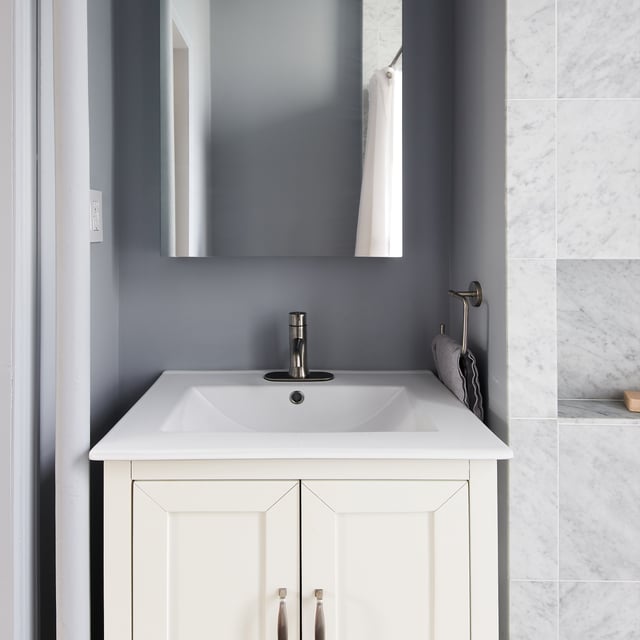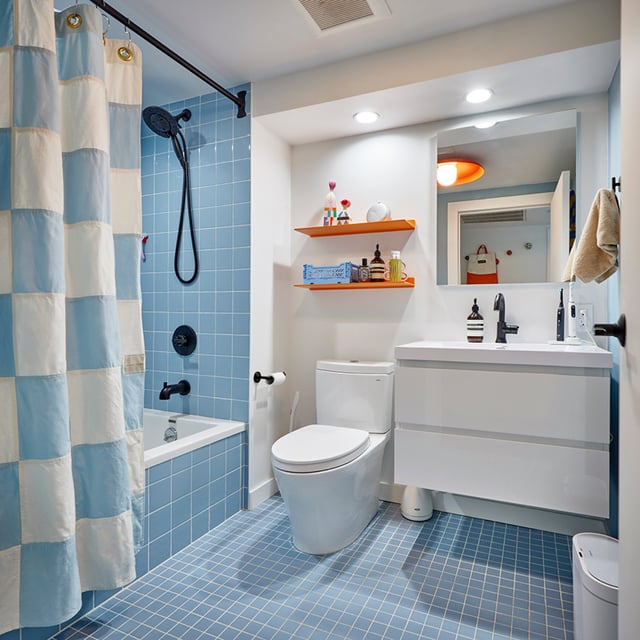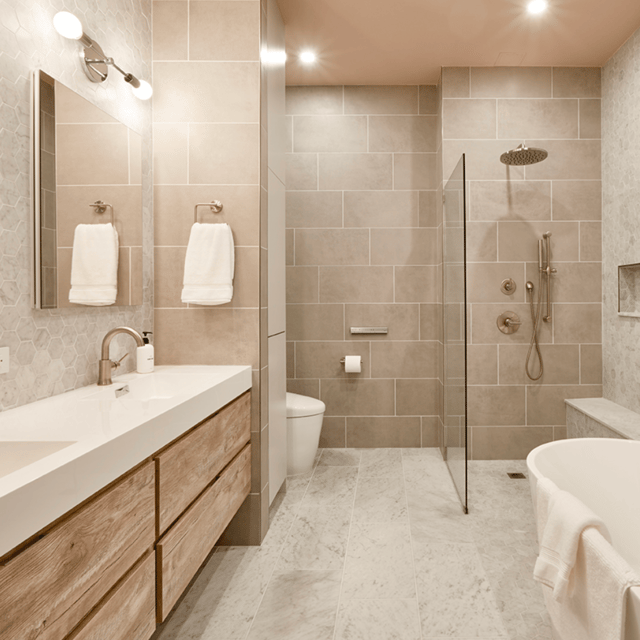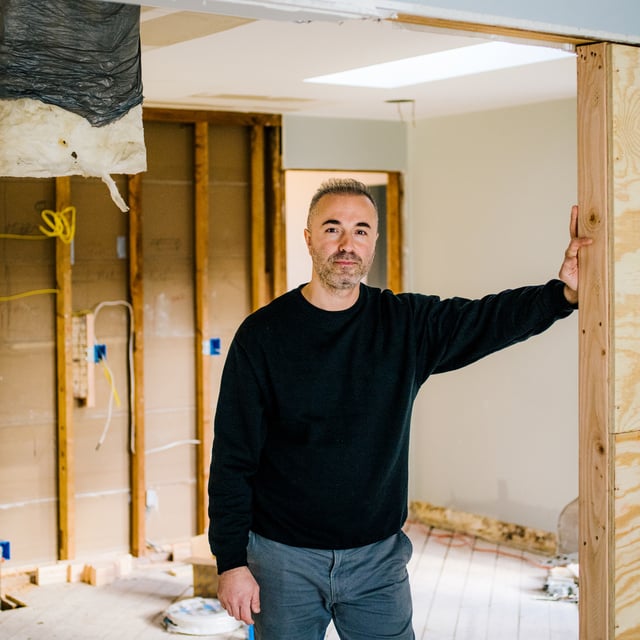
Remodeling
How to Renovate in New York City: A Complete Guide
03.19.2025

In This Article
Have you ever wondered what it takes to turn a New York City apartment into your dream home? In a city filled with older buildings and unique styles, renovating is a common adventure for many new apartment owners.
Understanding the local rules, costs, and processes is crucial before diving in. This guide will walk you through the essentials, providing insights into everything you need to know. You'll learn about renovation types, approval processes, budgeting, and hiring the right professionals.
Jumping into a renovation in NYC can feel like a big leap, but it's the first step towards creating a home that fits your style. Before picking up a hammer, it's important to understand the unique renovation landscape of the city. From building types to permissions, let's explore what sets NYC apartment renovations apart from the rest.
In NYC, you'll find two main types of apartment ownership: co-ops and condos. Co-ops, or cooperatives, mean you own shares in a corporation that owns the building, which often leads to stricter renovation rules. On the other hand, condos offer more freedom since you own your individual unit, but both require board approvals before any renovation work begins.
If your apartment is in a pre-war building, it's likely rich in classic details like high ceilings and hardwood floors. However, renovating might involve dealing with older plumbing and electrical systems. New construction often offers modern amenities and flexible spaces but may come with its own set of style guidelines to follow.
Living in a landmark or historic property can add charm and history to your apartment. However, renovations here require special permissions to preserve the building's historical integrity. This means you may need to work closely with conservation experts to ensure your updates respect the building's unique character.
Getting your renovation plans approved in NYC requires navigating both building boards and city regulations. Each building type has its own set of rules and processes, making approvals a key step in your renovation journey. Understanding these requirements will help you avoid delays and ensure your project runs smoothly.
Co-op boards have strict renovation policies to ensure that any changes maintain the building’s harmony and don't disturb other residents. These boards often require detailed architectural plans outlining every aspect of your renovation. Additionally, you're likely to face rules on noise restrictions and specific timelines, ensuring that the renovation process is respectful of neighbors' living conditions.
Unlike co-ops, condo boards generally offer more flexibility since you own your individual unit. However, you still need to submit plans for approval to ensure any renovations align with building standards and don't impact other units. This flexibility allows you more creative freedom, but approvals still need to be obtained to move forward with your project.
When renovating in NYC, it's vital to know which types of work require building permits:
The NYC Department of Buildings (DOB) is responsible for issuing these permits, ensuring compliance with safety and zoning regulations. To avoid common violations, always check if your project needs a permit, secure approvals before starting work, and adhere to all DOB guidelines to prevent fines or delays.
Learn More: A Guide to Bathroom Remodel Permits in NYC
Budgeting for a renovation in NYC can be one of the most challenging aspects of the project. With high costs per square foot and hidden expenses, careful planning is essential to keep your renovation on track. By understanding where your money goes, you’ll be better equipped to make informed decisions and avoid unexpected surprises.
In NYC, renovation costs can be quite high, often ranging from $100 to $300 per square foot, depending on the scope and quality of materials. Kitchens tend to be the most expensive rooms to update, with costs climbing due to cabinetry, appliances, and countertops. Bathrooms also require significant investment, with plumbing and fixture costs adding up quickly, while whole-apartment renovations need a comprehensive budget to cover all spaces and updates.
When planning your renovation budget, it's important to account for hidden costs that can catch you off guard. Building fees often come into play, such as move-in or move-out fees and deposits that your building might require. These fees can add up quickly, so it’s a good idea to check with your building management early on to understand what you'll owe.
Another area where expenses can grow is in hiring professionals like architects and designers. Their expertise is invaluable for a successful renovation, but they come with their own set of fees. Additionally, be prepared for permitting costs from the city, and always adhere to regulations to avoid potential fines. Planning for these expenses upfront will help prevent financial surprises during your renovation journey.
Financing your NYC apartment renovation can be done through several methods, such as home equity loans, renovation loans, and personal savings. Home equity loans allow you to borrow against the value of your apartment, while renovation loans are specifically designed to cover construction costs. Using personal savings gives you flexibility without the need for borrowing.
When considering financing options, keep in mind the special considerations for co-ops and condos. Co-ops often have stricter rules on borrowing, requiring board approval for loans, while condos typically offer more flexibility. It's important to understand these distinctions to choose the best financing path for your renovation needs.
Finding the right professionals for your renovation can make all the difference in bringing your vision to life. With so many specialists needed, from architects to contractors, selecting a team that fits your project’s needs is crucial. A knowledgeable team will ensure your renovation runs smoothly, efficiently, and stays within budget.
Hiring an architect is a smart move when your renovation involves significant changes to the layout or structure of your apartment. Architects bring expertise in planning, ensuring compliance with building codes, and can create detailed blueprints for your project. Interior designers play a vital role in maximizing space and enhancing aesthetics, helping to create a beautiful and functional living environment.
Choosing the right contractor is key to a successful renovation. Look for licensed and insured contractors in NYC to ensure they meet local standards and protect you from liabilities. To get accurate bids, provide clear project details, and compare estimates, making sure to get everything in writing to manage contracts effectively.
Specialists like structural engineers, plumbers, and electricians are crucial for safely executing specific parts of your renovation. Structural engineers ensure that changes are safe and sound, while plumbers and electricians handle essential systems that require expertise. Hiring skilled specialists will ensure your renovation meets all technical and safety requirements.
Renovating in NYC comes with its own set of unique challenges that homeowners need to be prepared for. From noise restrictions to old building issues, understanding these hurdles helps in planning a smoother project. Being aware of potential obstacles allows you to find solutions and keep progress on track.
In NYC, many buildings have specific rules to regulate construction noise to ensure residents' peace is maintained. Typically, renovations can only occur during certain hours, usually on weekdays, to minimize disruption. Knowing these rules and planning accordingly will help you avoid conflicts with neighbors and potential fines.
In buildings with limited elevator access, managing material deliveries and waste removal can be a logistical challenge. Scheduling elevator use in advance and planning deliveries during off-peak times can help alleviate congestion. It's important to coordinate closely with building management to ensure that renovation activities run smoothly.
Renovating older NYC buildings often uncovers common issues such as asbestos, outdated plumbing, and electrical wiring. These problems require careful handling by professionals to ensure safety and compliance with regulations. Being prepared to address these issues can save time and cost during your renovation project.

Designing for small NYC spaces requires creativity and smart planning to make the most of every square foot. With clever solutions, you can transform compact areas into functional and beautiful living spaces. Let's explore ways to maximize your apartment's potential without sacrificing style or comfort.
In NYC apartments, using space wisely is essential, and built-in furniture is a great way to achieve this like the built-in refrigerator cabinets. Hidden storage options, like under-bed drawers and wall-mounted cabinets, help keep your space organized without clutter. Multifunctional rooms, such as a living room that doubles as a home office, allow you to maximize the use of every area in your apartment.
Limited natural light is a common challenge in NYC apartments, but there are ways to enhance lighting and airflow. Using light-colored paint, mirrors, and strategic lighting fixtures can brighten up dark spaces. Additionally, positioning fans and selecting furniture that allows air circulation can improve airflow, making your home feel more open and airy.
Energy-efficient upgrades can make your apartment eco-friendly and reduce utility bills. Installing energy-saving windows helps keep your home insulated, while smart appliances offer convenience and efficiency. Water-efficient fixtures like low-flow toilets and showerheads contribute to conservation and can be a valuable addition to your renovation.
When renovating your NYC apartment, each room presents unique challenges and opportunities. By focusing on key considerations for different spaces, you can enhance functionality and aesthetics throughout your home. Let's dive into the essential aspects to consider when updating your kitchen, bathroom, living, and bedroom areas.
Maximizing small kitchen spaces in NYC often involves creative solutions like vertical storage and efficient layouts that make the most of limited areas. When it comes to finishes, you have options ranging from high-end materials, which add luxury and increase home value, to budget-friendly alternatives that provide style without breaking the bank. Balancing your budget and design preferences is key to achieving a kitchen that works beautifully for you.
In NYC, bathroom renovations must consider plumbing restrictions, as changing the layout might require significant adjustments and approvals. Drainage concerns are also important, so working with an experienced plumber ensures your renovation goes smoothly. Popular layouts for small bathrooms focus on space-saving fixtures, like wall-mounted toilets and compact vanities, that keep the space functional and stylish.
Deciding between open-concept living and maintaining separate rooms depends on your lifestyle needs and the space available. Open layouts can make small apartments feel larger, while distinct rooms offer privacy and dedicated areas for different activities. Soundproofing is another important consideration in NYC, where noise is common; using thicker walls, acoustic panels, and heavy drapes can help create a peaceful living environment.
Managing timeframes and overseeing your renovation project effectively can help avoid unnecessary delays and stress. Understanding realistic timelines and choosing the right management approach are crucial steps. With clear communication and organized planning, your NYC apartment renovation can progress smoothly from start to finish.
Renovation timelines in NYC can vary widely depending on the scope of the work. Minor updates, like painting or cosmetic changes, might take a few weeks, while full-scale renovations, such as kitchen or bathroom remodeling, can extend to several months. Factors that often delay renovations include waiting for permits and obtaining board approvals, so planning for these in advance is essential.
Deciding between DIY project management and hiring a project manager depends on your comfort level and the project's complexity. A project manager brings expertise and can save you time, ensuring everything stays on track, whereas DIY management gives you direct control but requires more personal involvement. Effective communication with contractors is key; make sure to set up regular check-ins and use tools like timelines and written agreements to track progress and address any issues promptly.

Before starting your NYC apartment renovation, it's crucial to understand the legal landscape to avoid potential pitfalls. Knowing the rules around building codes, insurance, and contracts protects your interests and ensures compliance. By addressing these considerations early, you can focus on your renovation with peace of mind.
Meeting NYC building code standards is a must for any renovation project to ensure safety and legality. It's essential to work with professionals who are familiar with these regulations and can guide your design and construction to meet all necessary requirements.
Understanding construction insurance and liability coverage is vital for protecting both you and your property. Make sure your contractor has the appropriate insurance to cover any damages or accidents that might occur during the renovation. This coverage not only safeguards your investment but also limits your liability in case of unforeseen events.
A well-crafted renovation contract is key to setting clear expectations with contractors and architects. Include details like project scope, timelines, payment schedules, and materials to be used. Having everything documented helps prevent misunderstandings and provides a reference point if any disputes arise.
A successful renovation hinges on careful planning, open communication, and smart decision-making. By anticipating challenges and preparing accordingly, you can navigate the renovation process with confidence. Here are some tips to help you achieve the home transformation you envision.
Starting the approval and permitting process early is crucial to avoid delays in your renovation timeline. Applying for permits and getting board approvals can take time, so it's best to tackle these tasks as soon as your plans are finalized.
Unexpected costs and delays are common in renovations, so it's wise to build a contingency fund into your budget. Keeping open lines of communication with your contractors helps you address issues quickly and adjust plans as needed to keep the project moving forward.
When planning renovations, consider features that will enhance the long-term value of your apartment in NYC's competitive real estate market. Upgrades like modern kitchens, updated bathrooms, and energy-efficient systems not only make your home more enjoyable but also more appealing to future buyers.
Renovating an NYC apartment can transform your space, but it's important to navigate the process carefully. We've covered key aspects like understanding building types, securing approvals, budgeting wisely, and hiring the right professionals.
Thorough planning and assembling a skilled team are crucial for a smooth renovation journey. By taking these steps, you can ensure your project is successful and adds value to your home. Ready to take the next step? Get your free estimate today.
What renovations require board approval in NYC apartments?
How long does it take to get renovation permits in NYC?
Can I renovate my kitchen or bathroom without changing the plumbing layout?
What are the common challenges of renovating an older NYC apartment?
How much does a typical NYC apartment renovation cost per square foot?

Renovate confidently with Block
Easily compare quotes from top quality contractors, and get peace of mind with warranty & price protections.
Thousands of homeowners have renovated with Block

4.5 Stars (100+)

4.7 Stars (100+)

4.5 Stars (75+)

Remodeling
How to Renovate in New York City: A Complete Guide
03.19.2025

Remodeling
A Complete Guide to Bathroom Renovation Costs in Brooklyn
03.19.2025

Bathroom
A Complete Guide To New York City Bathroom Remodels
03.13.2025

Contractors
Ultimate Guide to Bathroom Remodel Financing in 2025
03.13.2025

Process
10 Things to Consider Before Starting a Home Renovation
02.04.2025
Renovate confidently